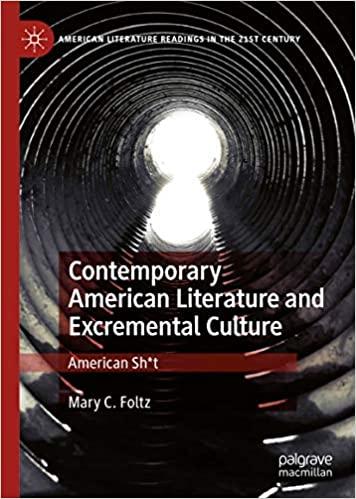In her latest book, Mary Foltz examines the ways several postmodern authors produce scatological works to critique how humans treat each other and the natural world

Credit: Palgrave Macmillan, 2020
“There is no big secret about sh*t: most people do not like it,” writes Mary Foltz, Associate Professor of English at Lehigh University, in one passage of her book, Contemporary American Literature and Excremental Culture: American Sh*t (Palgrave Macmillan, 2020). In it, Foltz, whose expertise is in American literature of the post-1945 period, explores how authors in the postmodern era have employed excremental culture to engage with urgent issues such as institutional racism, environmental justice and militarism.
Foltz will participate in a virtual book launch event in conversation with Rachele Dini, Lecturer in English and U.S. Literature at the University of Roehampton on Thursday, February 25, 2021 at 5:00 p.m. GMT (12:00 EST; 11:00 CST; 9:00 PST) hosted by the International Literary Waste Studies Network.
“These representations of waste and bathroom humor that keep coming up in fiction are actually calling us as readers to a deep engagement with our fear of our status as bodies, and specifically as waste-producing bodies,” says Foltz. “That fear really maps out onto a larger cultural problem in which we don’t want to think about not only bodily waste, but the other kinds of waste our cities, our regions and our nation are producing.”
In the book, Foltz explores representations of waste in five post-1960 American novels: Ishmael Reed’s The Free-Lance Pallbearers (1967), Jonathan Franzen’s The Corrections (2001), Gloria Naylor’s Linden Hills (1985), Don DeLillo’s Underworld (1997) and Samuel R. Delany’s The Mad Man (1994).
In Reed’s The Free-Lance Pallbearers, a character named Harry Sam, a stand-in for “Uncle Sam,” rules a city from a toilet throne. While he sits on this throne he is leaking a range of waste materials: sewage, industrial waste, military waste, even dead bodies. In addition to its critique of environmental degradation, says Foltz, the book also addresses how, according to Reed, African American communities in the United States are treated like human waste.
“You get this sort of nationalist figure that’s just laying waste to the environmental world and just dumping on African American communities,” says Foltz. “It speaks to the importance of thinking about environmental issues in relationship to which communities unequally bear the burden of our processes of disposal.”
The chapter exploring Naylor’s Linden Hills is titled”Fleeing the Excremental Stain Through Acquisition: Getting to the Bottom of Black Suburban Splendor in Gloria Naylor’s Linden Hills.” In the novel, one of the young Black male characters is nicknamed White and another is called Sh*t.
“Naylor is really playing with constructions of race and fantasies about racial difference,” says Foltz. “She also employs metaphors of waste to critique how we understand value through capitalism in the U.S.”
In the novel DeLillo follows the protagonist, writes Foltz, “…in his employment as a waste broker in detailed accounts of his movement from the United States to Semipalatinsk Polygon, now known as National Nuclear Center of Kazakhstan, where his company and others seek to dispose of toxic waste.”
DeLillo, says Foltz, is interested in the connection between weapons and waste. “He is linking communities like the Kazakh communities that were utilized for the testing of nuclear weapons to the fact that they then became places where nations wanted, and still want, to dispose of their waste.”
Foltz says these works are calling on readers to embrace themselves as waste-producing beings and to engage more strongly with waste disposal systems for the sake of life and the bioregions that sustain it. She expresses hope that themes of waste in postmodern literature offer a way to, she writes, “Resurrect the vulnerable excremental body as the fertile way back to the world and each other.”
###
If interested in attending the virtual book launch on Thursday, February 25, 2021, please contact Professor Foltz at: [email protected].
Media Contact
Lori Friedman
[email protected]




